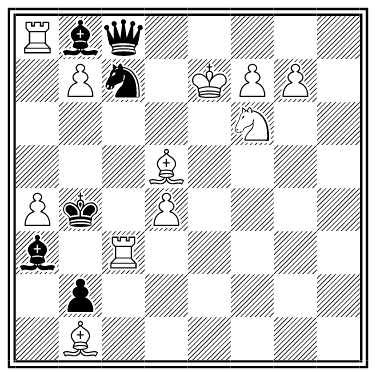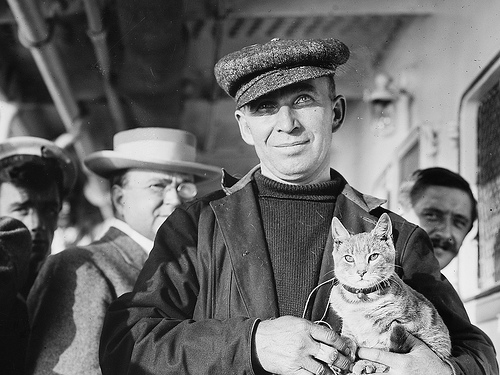“The more original a discovery, the more obvious it seems afterward.” — Arthur Koestler
The Long and the Short of It
In July 1838, Charles Darwin was considering whether to propose to his cousin, Emma Wedgwood. Ever the rationalist, drew up a balance sheet:

At the bottom he wrote “Marry – Marry – Marry Q.E.D.” They were wed in January.
Don’t Even Try

White or Black to play and mate or self-mate in one move. That is, you must find a total of four moves from this position: a White move that mates Black instantly, a White move that forces Black to mate White instantly, and equivalent moves for Black.
“Memo: The above puzzle depends on a literal interpretation of the rule which provides that a Pawn on reaching the eighth square may become any piece irrespective of colour.”
WARNING: “This monstrosity is the production of an erratic solver who has been sorely tried, puzzled and perplexed all the year round by the many posers and problems which have appeared from time to time in the numerous Chess columns. His aesthetic patience, resignation, fortitude, culture and hope all at once breaking down, he set to work and with wrathful spirit, regardless of all problem construction, devised it more for the sake of retaliation and revenge than to give pleasure. To prove his spiteful character; when composing it, he was overheard repeating, ‘Since I cannot prove a lover to entertain these fair spoken days, I am determined to prove a villain.’ Consequently, gentle reader, we warn you not to attempt it, except indeed that you are the happy possessor of that knowledge wherein you are able to puzzle others. It may look beastly simple, but to any young solver who may be foolhardy enough to venture it we offer a few words of advice–carefully study the above memo and note that–but ‘hold enough,’ no more can we divulge, fearful of bringing the fiery wrath of the exasperated composer upon our devoted heads.”
“Snow in the Ball-Room”
The following anecdote is told by Professor Dove, of Berlin, in illustration of the production of snow by change of temperature. On an extremely cold but starlight night, a large company had assembled in a ballroom in Sweden, which in the course of the evening became so warm that some of the ladies fainted. An officer tried to open a window, but found it was frozen to the sill. He then broke a pane of glass, and the rush of cold air from without produced a fall of snow in the room. Its atmosphere was charged with vapour, which, becoming suddenly condensed and frozen, fell in the form of snow upon the astonished dancers.
— The World of Wonders, 1883
Gesundheit!
Sneezes around the world:
- France: Atchoum!
- Finland: Atsiuh!
- Iceland: Atsjú!
- Sweden: Atjo!
- India: Akchhee!
- Denmark: Atju!
- Netherlands: Hatsjoe!
- Lithuania: Apchi!
- Germany: Hatschie!
- Hungary: Hapci!
- Poland: Apsik!
- Russia: Apchkhi!
- Italy: Etciù!
- Spain: ¡Achís!
- Portugal: Atchim!
- Romania: Hapciu!
- Philippines: Hatsing!
- Japan: Hakushon!
- South Korea: Achee!
- Vietnam: Hát-xì!
See also “Lides to Bary Jade.”
Please Stand By

On Oct. 15, 1910, the airship America took off from Atlantic City in a bid to cross the Atlantic. The six crewmembers took along a cat, Kiddo, for luck.
The frightened tabby was still underfoot when chief engineer Melvin Vaniman tried to send a historic wireless message back to shore. So officially the first radio communication ever made from an airship in flight was:
“Roy, come and get this goddamn cat.”
Finders’ Fees

Donald Knuth is so revered among computer scientists that they won’t cash his checks.
Knuth offers a standard reward of $2.56 (one “hexadecimal dollar”) to the first finder of each error in his published books. Since 1981 he has written more than $20,000 in checks, but most of the recipients have simply framed them as points of pride.
“There’s one man who lives near Frankfurt who would probably have more than $1,000 if he cashed all the checks I’ve sent him,” Knuth said in an October 2001 lecture. “Even if everybody cashed their checks, it would still be more than worth it to me to know that my books are getting better.”
Epimenides Soused
Somebody had told me of a dealer in gin who, having had his attention roused to the enormous waste of liquor caused by the unsteady hands of drunkards, invented a counter which, through a simple set of contrivances, gathered into a common reservoir all the spillings that previously had run to waste. … It struck me, therefore, on reviewing this case, that the more the people drank, the more they would titubate, by which word it was that I expressed the reeling and stumbling of intoxication. … [T]he more they titubated, the more they would spill; and the more they spilt, the more, it is clear, they did not drink. … Yet, again, if they drank nothing worth speaking of, how could they titubate? Clearly they could not; and, not titubating, they could have had no reason for spilling, in which case they must have drunk the whole–that is, they must have drunk to the whole excess imputed, which doing, they were dead drunk, and must have titubated to extremity, which doing, they must have spilt nearly the whole. … ‘And so round again,’ as my lord the bishop pleasantly expresses it, in secula seculorum.
— Thomas de Quincey, Essays on Philosophical Writers, 1856
The Value of a Dollar

You might have had trouble making change in postwar Hungary — the national currency, the pengo, was plunging so quickly in value that prices doubled every 15 hours.
To simplify calculations, the government eventually introduced a banknote worth 100 quintillion pengo. It was worth 20 American cents.
Things only got worse. By July 1946, the monthly inflation rate had reached 41,900,000,000,000,000 percent, and, unbelievably, the combined value of all Hungarian banknotes equaled one-thousandth of a U.S. dollar.
In desperation the government gave up and introduced a new currency, the forint. In the end you could get 1 new forint by trading in 400,000,000,000,000,000,000,000,000,000 (400 octillion) pengo.
That’s the all-time record for hyperinflation — but modern Zimbabwe is not far behind. In fact, because Hungary couldn’t fit all 20 zeroes on that banknote, the 2006 Zimbabwean bill below holds the record for depicted zeroes on a national currency.

Reunited
In 1719 a body, preserved from corruption by the vitriolic water with which it had been saturated, was found in an abandoned part of the Fahlun mines [of Sweden]. When it had been brought up to the surface, the whole neighbourhood flocked together to see it; but nobody could recognise a lost friend or kinsman in its young and handsome features. At length an old woman, more than 80 years of age, approached with tottering steps, and casting a glance on the corpse, uttered a piercing shriek and fell senseless on the ground. She had instantly recognised her affianced lover, who had mysteriously disappeared more than sixty years previously, but whose image she still bore in her faithful memory. As he was not employed in the mines, no search had been made for him underground at the time. Most probably he had fallen, by some accident, into one of the numerous crevices by which the surface of the mines is traversed. Thus the tottering woman, weighed down with the double burden of infirmity and age, saw once more the face of her lover as she had looked upon it in the days of her youth.
— Georg Hartwig, The Subterranean World, 1871
